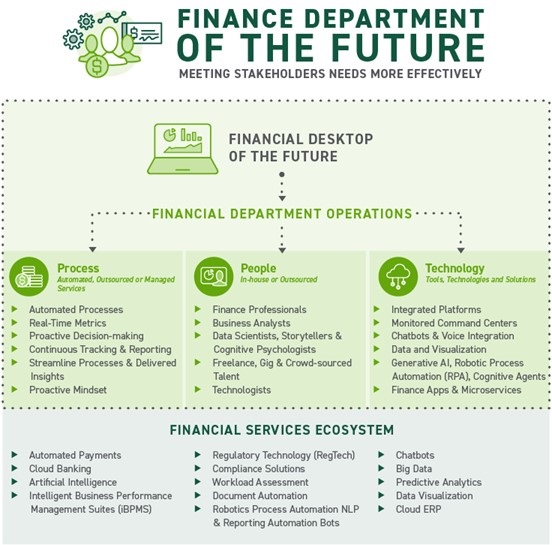Evolution of the CFO
The role of the Chief Financial Officer (CFO) continues to evolve and expand due to a changing business landscape. While the primary role of a CFO centers around financial management, there are several emerging trends that will shape the future role of CFOs. We are living in an increasingly volatile, uncertain, complex and ambiguous (VUCA) multilateral world, especially with the rapid pace of change in business. Organizations must adapt to change and innovation, while simultaneously aligning their people, technology, processes and culture.
CFO as a Catalyst in Digital Transformation
True digital transformation entails reconfiguring all areas of your business for success, and fundamentally changing how you operate and deliver value to customers by leveraging technology. Digitalizing your business is a continuing journey that requires ownership at the highest levels of the organization, as well as significant investment.
In the 21st century, the CFO’s role has progressed from exclusively focusing on the financial performance of the organization to becoming a proactive strategic c-suite business partner and providing insights and guidance to drive overall business profitability and growth. Some business challenges faced by CFOs include the globalization of businesses and markets, frequent business and market risks, increasing stakeholder expectations, and evolving technologies that impact business, people, processes and operations.
Modernizing CFO Skills and Capabilities
According to IBM’s Institute for Business Value CFO study, CEOs have already identified CFOs as having one of the most essential roles in their organization. The CFO is a “value integrator” who has a profound influence on the organization’s performance. To be effective, the “CFO of the Future” must acquire skills and capabilities that go beyond deep technical and accounting expertise, strong ethics, integrity and professionalism. The skills and capabilities necessary for the “CFO of the Future” are:
Leadership & Sensemaking (Business Skills)
- Lead a team with diverse skills and capabilities
- Provide insights on emerging trends
- Be forward-looking
- Leverage financial data in decision-making
Anticipation of Evolving Needs (People Skills)
- Embrace a culture of change and learning
- Effectively team across business units
Strategic & Critical Thinking (Agility)
- Demonstrate agility in addressing emerging threats
- Think and act proactively
- Develop analytical skills to provide greater value
- Be flexible and wear multiple hats
Communication & Storytelling (Leadership Skills)
- Establish credibility
- Communicate effectively with internal and external stakeholders
- Collaborate with business and support functions
Integration & Collaboration (Digital Skills)
- Be digitally savvy
- Understand the impact of new technologies on business
- Leverage technology to drive transformation and change
Overall, the “CFO of the Future” will have a combination of financial expertise, strategic thinking, technological acumen and effective leadership skills. CFOs will be instrumental in driving sustainable growth, managing risks and creating long-term value for their organizations.
Digitally Transforming the Finance Department
For the “CFO of the Future” to be effective, the finance department must also undergo digital transformation. The “Finance Department of the Future” will be proactive, rather than reactive, provide continuous monitoring, be predictive and forward looking, partner and team across business units, and be staffed with professionals that have a broad range of skills and capabilities who are focused on providing value-added insights. The department will be enabled by a complex ecosystem of tools and technologies, automation, shared service centers, outsourced service providers, and internal and external professionals.
Finance Department of the Future

Enabling Finance Transformation With Technology
Technology will be a key enabler to drive change. While people will continue to play a critical role in finance, they will be increasingly enabled by technologies such as generative AI, chatbots, machine learning (ML), robotic process automation (RPA) and data analytics. This will streamline business processes, enable analysis and visualize data, while ensuring greater accuracy and efficiency in executing monotonous and repetitive tasks. Also, integrated solutions for finance processes, risk and regulatory tracking and reporting will be leveraged by businesses to meet complex, compliance and regulatory requirements.
Harnessing the power of generative AI within the finance department’s processes will accelerate productivity and growth, while strategically and operationally building resilience. Generative AI can sum up large data sources immersed into the existing enterprise resource planning (ERP) systems and analyze predictive analytics, leading to smarter business decision making.
By leveraging technology, the finance department can:
- Reduce human error and enhance visibility into finance processes
- Increase efficiency and improve productivity with workflow automation and speed of month-end close processes
- Deliver higher-value services to customers and stakeholders more efficiently
- Achieve workforce realignment to encourage focus and coordination, making it easier to identify and realize synergies
- Focus on systematic approaches with optimal control to minimize time and energy spent gathering and analyzing accurate data
- Increase focus on organization-wide business initiatives
Original published at Cherry Bekaert.
Tag/s:Business TransformationDigital EnterpriseFuture of WorkOrganizational Change






Very nicely outlined Nita! It would seem that the role of the modern CFO is not that different than the role of the modern CIO…both need to be visionary, business-centric and people (talent) lifting.